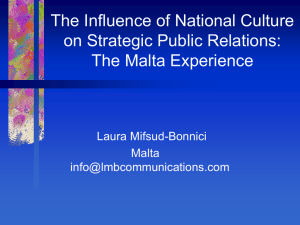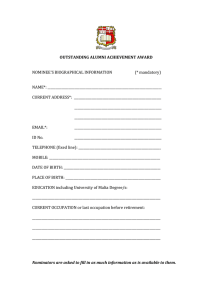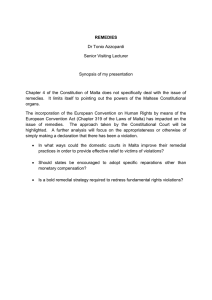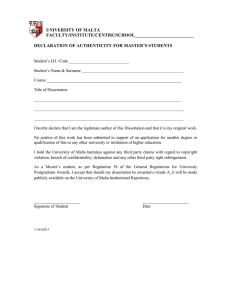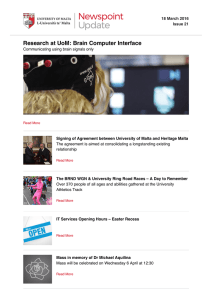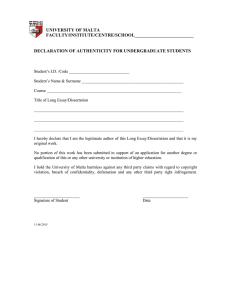Graduation Ceremony 7 Wednesday 26th November 2014 at 4.30 p.m.
advertisement
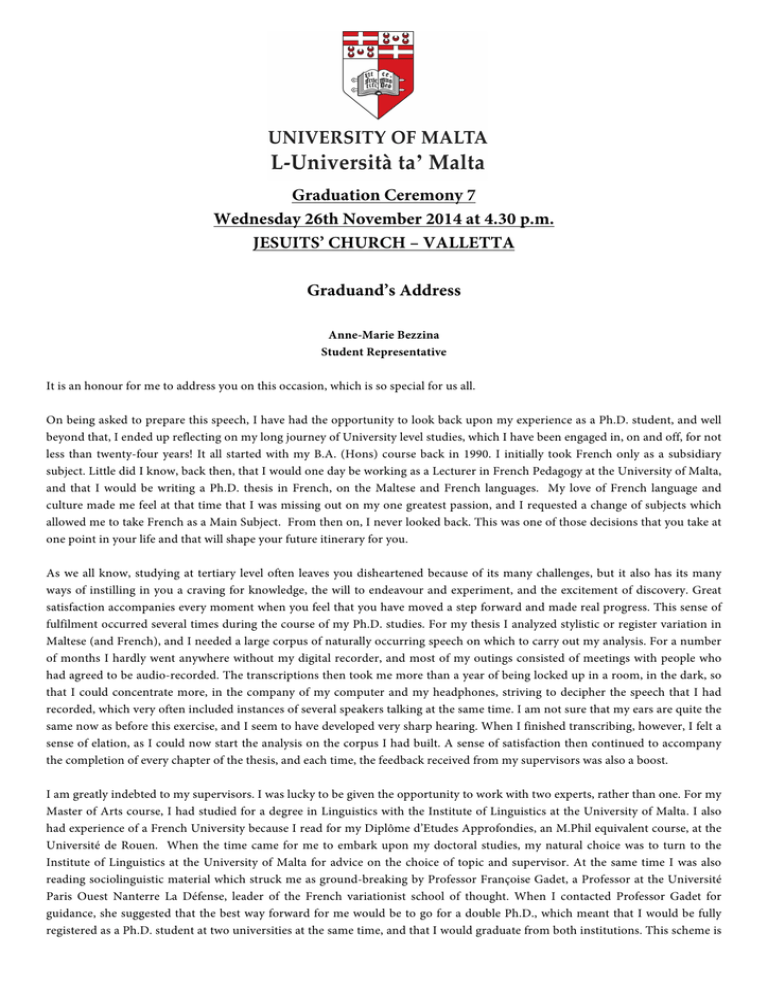
Graduation Ceremony 7 Wednesday 26th November 2014 at 4.30 p.m. JESUITS’ CHURCH – VALLETTA Graduand’s Address Anne-Marie Bezzina Student Representative It is an honour for me to address you on this occasion, which is so special for us all. On being asked to prepare this speech, I have had the opportunity to look back upon my experience as a Ph.D. student, and well beyond that, I ended up reflecting on my long journey of University level studies, which I have been engaged in, on and off, for not less than twenty-four years! It all started with my B.A. (Hons) course back in 1990. I initially took French only as a subsidiary subject. Little did I know, back then, that I would one day be working as a Lecturer in French Pedagogy at the University of Malta, and that I would be writing a Ph.D. thesis in French, on the Maltese and French languages. My love of French language and culture made me feel at that time that I was missing out on my one greatest passion, and I requested a change of subjects which allowed me to take French as a Main Subject. From then on, I never looked back. This was one of those decisions that you take at one point in your life and that will shape your future itinerary for you. As we all know, studying at tertiary level often leaves you disheartened because of its many challenges, but it also has its many ways of instilling in you a craving for knowledge, the will to endeavour and experiment, and the excitement of discovery. Great satisfaction accompanies every moment when you feel that you have moved a step forward and made real progress. This sense of fulfilment occurred several times during the course of my Ph.D. studies. For my thesis I analyzed stylistic or register variation in Maltese (and French), and I needed a large corpus of naturally occurring speech on which to carry out my analysis. For a number of months I hardly went anywhere without my digital recorder, and most of my outings consisted of meetings with people who had agreed to be audio-recorded. The transcriptions then took me more than a year of being locked up in a room, in the dark, so that I could concentrate more, in the company of my computer and my headphones, striving to decipher the speech that I had recorded, which very often included instances of several speakers talking at the same time. I am not sure that my ears are quite the same now as before this exercise, and I seem to have developed very sharp hearing. When I finished transcribing, however, I felt a sense of elation, as I could now start the analysis on the corpus I had built. A sense of satisfaction then continued to accompany the completion of every chapter of the thesis, and each time, the feedback received from my supervisors was also a boost. I am greatly indebted to my supervisors. I was lucky to be given the opportunity to work with two experts, rather than one. For my Master of Arts course, I had studied for a degree in Linguistics with the Institute of Linguistics at the University of Malta. I also had experience of a French University because I read for my Diplôme d’Etudes Approfondies, an M.Phil equivalent course, at the Université de Rouen. When the time came for me to embark upon my doctoral studies, my natural choice was to turn to the Institute of Linguistics at the University of Malta for advice on the choice of topic and supervisor. At the same time I was also reading sociolinguistic material which struck me as ground-breaking by Professor Françoise Gadet, a Professor at the Université Paris Ouest Nanterre La Défense, leader of the French variationist school of thought. When I contacted Professor Gadet for guidance, she suggested that the best way forward for me would be to go for a double Ph.D., which meant that I would be fully registered as a Ph.D. student at two universities at the same time, and that I would graduate from both institutions. This scheme is called “cotutelle” in France and is widely followed in French universities. I am very grateful that Rector, Professor Camilleri, welcomed the idea of this partnership between the two universities, and I am also grateful to the Registrar’s Office which dealt with the administrative and legal matters related to the signing of the contract between the two universities. When this was settled, as a student registered at both institutions, I greatly benefitted from the double guidance and training that I was receiving. The impact by my Maltese supervisor, Professor Albert Borg, was crucial to my interpretation of the sociolinguistic implications of language use and distribution in the Maltese islands, and to an optimal exploitation of my corpus. I greatly appreciated Professor Borg’s thorough readings of my drafts. Professor Françoise Gadet’s theoretical guidance on stylistic variation molded my reflections on the theoretical level. I also received feedback and further training through doctoral seminars organized by the Institute of Linguistics here in Malta, and by both the Doctoral School and the Research Laboratory that I belonged to in the French university. These structures allowed me to have my first experiences of academic conferences. Even now that I have finished my studies, the Research Laboratory network continues to send me very valuable information on calls for papers, recent publications and upcoming conferences. It would be, in my view, very helpful to doctoral students and graduates of the University of Malta, if there were, for every field of knowledge, or for every department or institute of the University, such structures and networks operating with the aim to diffuse information to doctoral students on possibilities to contribute in conferences and to publish, for instance in peer-reviewed journals. This would stimulate more research, and would be very enriching for the academic development of the University of Malta’s Ph.D. students and graduates, and would give them and the University itself more visibility on the local and international research scene. When my thesis was drawing to its end, the coordination of a one-year extension period and especially of the viva voce examination set-up necessitated much negotiation between the two universities and all persons involved. I am grateful to Professor Ray Fabri, Director of the Institute of Linguistics, who was a crucial figure for the smooth running of these administratively demanding milestones. I am also very grateful to the Board of Examiners, who in their thesis report, and during the viva voce examination itself, suggested valuable contacts abroad, future projects and further readings related to my topic. This truly enriched my Ph.D. experience, and I know that there is much room for further development of my research in the future. Now that, as I am graduating with a Ph.D. in Linguistics from the University of Malta, and with a Doctorat en Sciences du Langage from the Université Paris Ouest Nanterre La Défense, I come to take stock of this experience, I can make a very positive assessment of the benefits of studying for a double Ph.D., and I encourage graduands here to explore the possibility of partnerships with universities abroad, and any other research and training experiences which may broaden their horizons. Partnerships with foreign universities may also prove to be a way in which the University of Malta could continue to reaffirm its already solid presence in the network of salient academic institutions internationally. I am also grateful to the Malta Government Scholarship Scheme, which funded my studies. Financial help through the MGSS scholarship was important to me, especially in the first two years of my studies, when I had no other source of income. I had in fact planned to study for my Ph.D. on a full-time basis while on parental leave after the birth of my second son. Studying when one is a parent to young children means that you have to have very good time management and discipline. I intended to divide my time between my studies and my family, but two years down the line a post for a Resident Academic lecturing in French within the Faculty of Education was advertised. This was an opportunity not to be missed, and when I was selected for the job, there was now another important duty in my life. Being in an academic environment however helped me in my studies, as it kept me focused. I wish to thank the Rector of the University, the Dean of my Faculty, Professor Valerie Sollars, and the Deputy Dean and my Head of Department, Professor Sandro Caruana, for the support shown to me during my years as Assistant Lecturer preparing for a Ph.D. Upon my employment, the MGSS scholarship continued to help by funding my course fees. I encourage graduands present here today to apply for scholarships which can fund their post-graduate studies, as these relieve the financial burden that such studies entail. In my address so far I have had the opportunity to mention and thank several persons who helped me in one way or another to achieve success in my studies. A special thank you goes once again to my supervisors, Professors Albert Borg and Françoise Gadet. I would not be here sharing these reflections with you however, if it were not for the support received from my family, who went through many sacrifices so that I could complete my studies. I am indebted to my dear husband and my younger son Paul, to my mother and sister, and to my very special elder son Patrick, who is here sharing this special occasion with me, and who was throughout this journey, and always will be, my greatest source of inspiration. Likewise, I think that all my fellow graduands owe much to their parents and families, who have borne the brunt of our moods and dejection, whenever we were faced with stiff challenges, and who have lent a helping hand whenever possible. Therefore, I thank and congratulate all the families who have proudly accompanied their graduands here today to share the joy and the well-deserved reward of their achievement. I would finally like to express my most sincere wishes of good luck to you all.
